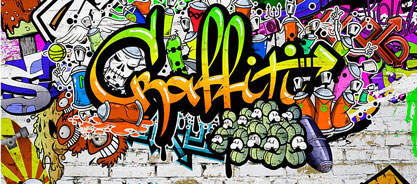
Graffiti
Who doesn’t prefer approval, being well received, thought of with affection by one’s fellows. Nietzsche was no different than you or I. That variety of genteel, decorous social embrace, idealized in storytelling of the Victorian era is what we’d all wish, because then each of us has his/her place in the tribe without fissure of any doubt.
“Honesty” even when qualified as “wild” is certainly not cruelty. Nietzsche writes that honesty belongs with other “beautiful, twinkling, tinkling, festive words” guaranteed to arouse pride. However as one works over a period of time, somehow one loses a taste for the bright and shiny, (like a string of LED party lights) accolades.
What is truth, and knowledge, and heroism? Never mind all of that, no more than graffiti seducing the eye, a distraction from the unyielding, fundamental, rock-ribbed, pitiless substrate. Underneath the colorful painted surface I and you, my friend, are a standard edition of our species. No more and certainly no less.
In fact, it would sound more polite
if, instead of cruelty,
people were to accuse, mutter about and praise us
as having a sort of “wild honesty”…
In the meantime – …
we are the least likely
to dress ourselves up
with these sorts of moral baubles and beads:
all the work we have done so far has spoiled our taste
for precisely this sort of bright opulence.
These are beautiful, twinkling, tinkling, festive words:
genuine honesty,
love of truth,
love of wisdom,
sacrifice for knowledge,
the heroism of truthfulness,
– there is something about them that makes you swell with pride.
But
we hermits and marmots,
we convinced ourselves a long time ago
and in all the secrecy of a hermit’s conscience
that even this dignified verbal pageantry belongs
among the false old finery, debris, and gold dust of unconscious human vanity,
and that the terrible basic text
of homo natura
must be recognized
even underneath these fawning colors and painted surfaces…
Beyond Good and Evil, By Friedrich Nietzsche, trans. by Judith Norman, aphorism 230